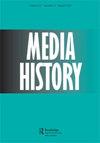The Influence of Japanese Colonialism on Post-Independence Indonesian Radio
IF 0.4
Q4 COMMUNICATION
引用次数: 0
Abstract
This paper revisits the history of Indonesian broadcasting, focusing particularly on the broadcasting model implemented during the Japanese occupation (1942–1945) and its influence on broadcast organizations in the post-independence era. Taking into consideration four elements of broadcast governance—remit, structure, ownership, and funding—this study examines how the Japanese colonial model of radio became the model used by the Radio of the Republic of Indonesia. Examining the broadcast policies of colonial Japan and post-independence Indonesia, this paper finds policy connections between these countries’ broadcast systems. Japanese colonial policy remained evident in the management of Indonesia’s radio in the early independence era, particularly in the use of autocratic political propaganda and centralized control of media content. Even today, the military media of colonial Japan continues to influence how broadcasters serve Indonesia’s national interests. This paper fills the gap in the literature on how Japanese colonialism has affected broadcast systems of Asia.日本殖民主义对独立后印尼广播的影响
本文回顾了印度尼西亚广播的历史,特别关注日本占领期间(1942-1945)实施的广播模式及其对独立后时代广播组织的影响。考虑到广播治理的四个要素——职权范围、结构、所有权和资金——本研究考察了日本殖民时期的广播模式如何成为印度尼西亚共和国广播电台所使用的模式。本文考察了殖民时期的日本和独立后的印度尼西亚的广播政策,发现了这些国家广播系统之间的政策联系。在印尼独立初期,日本的殖民政策在印尼电台的管理上仍然很明显,特别是在使用专制的政治宣传和对媒体内容的集中控制方面。即使在今天,日本殖民时期的军事媒体仍在继续影响广播公司如何为印尼的国家利益服务。本文填补了日本殖民主义如何影响亚洲广播系统的文献空白。
本文章由计算机程序翻译,如有差异,请以英文原文为准。
求助全文
约1分钟内获得全文
求助全文

 求助内容:
求助内容: 应助结果提醒方式:
应助结果提醒方式:


